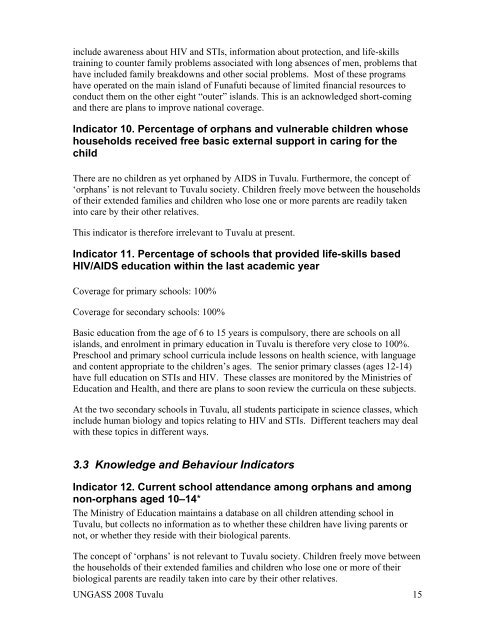Yes - unaids
Yes - unaids
Yes - unaids
You also want an ePaper? Increase the reach of your titles
YUMPU automatically turns print PDFs into web optimized ePapers that Google loves.
include awareness about HIV and STIs, information about protection, and life-skillstraining to counter family problems associated with long absences of men, problems thathave included family breakdowns and other social problems. Most of these programshave operated on the main island of Funafuti because of limited financial resources toconduct them on the other eight “outer” islands. This is an acknowledged short-comingand there are plans to improve national coverage.Indicator 10. Percentage of orphans and vulnerable children whosehouseholds received free basic external support in caring for thechildThere are no children as yet orphaned by AIDS in Tuvalu. Furthermore, the concept of‘orphans’ is not relevant to Tuvalu society. Children freely move between the householdsof their extended families and children who lose one or more parents are readily takeninto care by their other relatives.This indicator is therefore irrelevant to Tuvalu at present.Indicator 11. Percentage of schools that provided life-skills basedHIV/AIDS education within the last academic yearCoverage for primary schools: 100%Coverage for secondary schools: 100%Basic education from the age of 6 to 15 years is compulsory, there are schools on allislands, and enrolment in primary education in Tuvalu is therefore very close to 100%.Preschool and primary school curricula include lessons on health science, with languageand content appropriate to the children’s ages. The senior primary classes (ages 12-14)have full education on STIs and HIV. These classes are monitored by the Ministries ofEducation and Health, and there are plans to soon review the curricula on these subjects.At the two secondary schools in Tuvalu, all students participate in science classes, whichinclude human biology and topics relating to HIV and STIs. Different teachers may dealwith these topics in different ways.3.3 Knowledge and Behaviour IndicatorsIndicator 12. Current school attendance among orphans and amongnon-orphans aged 10–14*The Ministry of Education maintains a database on all children attending school inTuvalu, but collects no information as to whether these children have living parents ornot, or whether they reside with their biological parents.The concept of ‘orphans’ is not relevant to Tuvalu society. Children freely move betweenthe households of their extended families and children who lose one or more of theirbiological parents are readily taken into care by their other relatives.UNGASS 2008 Tuvalu 15















